|
Limitar tu búsqueda
[+–] Creator
- Acevedo, Germán (1)
- Bertranou, Fabio (1)
- Blair, Randall (1)
- Borraz, Fernando (1)
- Calderón-Madrid, Angel (1)
- Campuzano, Larissa (1)
- Cox-Edwards, Alejandra (1)
- Delgado, Guilherme C. (1)
- Eskenazi, Patricio (1)
- González, Nicolás (1)
- James, Estelle (1)
- Levy, Dan (1)
- Moreno, Lorenzo (1)
- Pagés, Carmen (1)
- Premand, Patrick (1)
- Pérez Yarahuán, Gabriela (1)
- Querino, Ana Carolina (1)
- Rodríguez-Oreggia, Eduardo (1)
- Sadoulet, Elisabeth (1)
- Scott, John (1)
- Vakis, Renos (1)
- Wong, Rebeca (1)
- de Janvry, Alain (1)
[+–] Editorial
[+–] Fecha
[+–] Formato
[+–] Idioma
[+–] Tipo de documento
[+–] Tipo de recurso
[+–] Classification
- Revistas -- Well-being and Social Policy [X]
|

|
|
The gender impact of social security reform in Latin America
Recent multi-pillar pension reforms tighten the link between payroll contributions and benefits, leading critics to argue that they will hurt women, who have less continuous employment and earn lower wages than men. However, these reforms also remove distortions and target redistributions to low earners, which help women. This paper tests these conflicting claims in the case of three Latin...
|
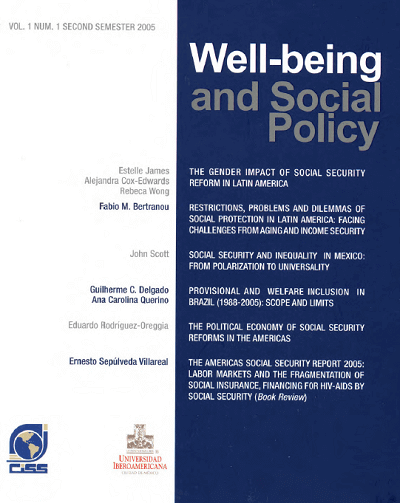
|
|
|
|

|
|
Restrictions, problems and dilemmas of social provision in Latin America: facing challenges from aging and income inequality
This paper discusses the main restrictions, problems and dilemmas that social provision faces in Latin America in a context of demographic changes and low achievements in the economic performance, particularly in the labor market. It is proposed the need to adapt the general social provision matrix as function of priorities and restrictions set by financing access. Due to the limited labor...
|
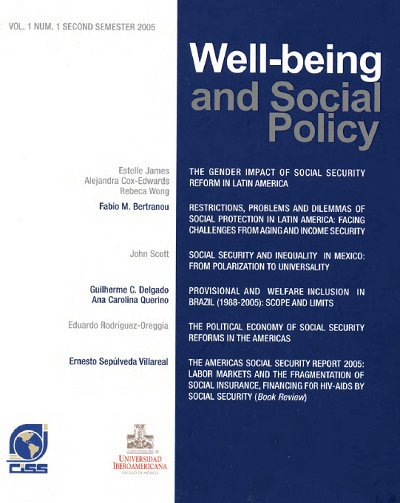
|
|
|
|

|
|
Social security and inequality in Mexico: from polarization to universality
The article documents the failure of social security in Mexico as an instrument of social protection and evaluates possible reform strategies. It analyses the truncated coverage of these systems for the most vulnerable, the regressive incidence and horizontal inequities of public social security subsidies, and the consequences for old-age poverty and inequalities in basic health opportunities. It...
|
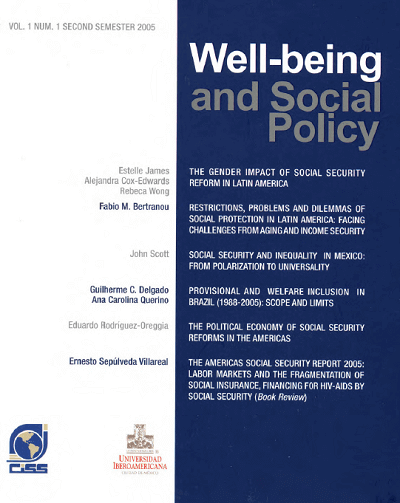
|
|
|
|

|
|
Provisional and welfare inclusion in Brazil (1988-2005): scope and limits
This paper analyses the influence of new rights derived from the Social Security System in Brazil after the Federal Constitution (1988). At least, three different and independent forces determinate the arrangements in social security policies: 1) the new social rights created by constitutional rules in response to social pressure; 2) the decrease of employment and wages in salaried jobs imposed...
|
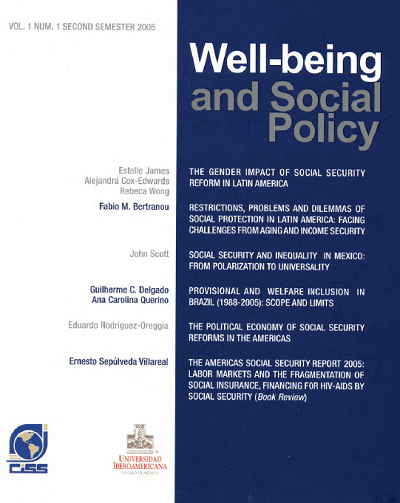
|
|
|
|

|
|
The political economy of social security reforms in the Americas
This paper analyses the factors affecting the decision to apply a reform (parametric and structural) in the Americas, which may hold a specific set of conditions, i.e. a sui generis political system and a high degree of economic openness, among others. Economic freedom is relevant in the case of structural reforms, while results for the share of older population are not conclusive. It may be that...
|
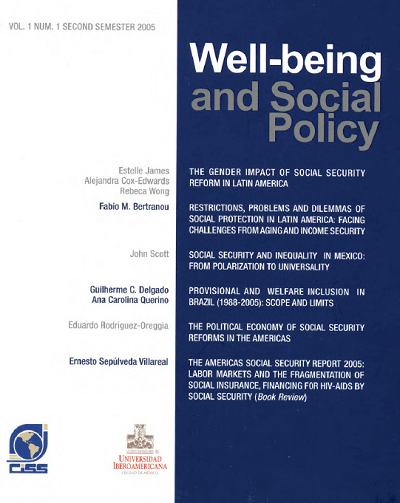
|
|
|
|

|
|
Unemployment insurance in Chile: a new model of income support for unemployed workers
This paper describes the Chilean experience concerning the implementation of a new unemployment insurance (UI) program. The use of individual savings accounts and private management are essential elements. In addition, a redistributive fund (Common Fund) helps workers pool risks, distributing resources from employed to unemployed workers and from stable firms to workers with low incomes and...
|
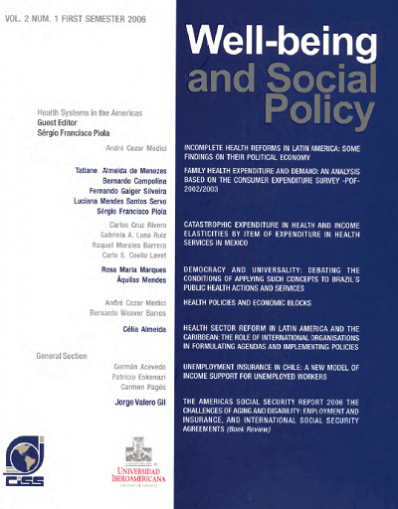
|
|
|
|

|
|
Toward closing the evaluation gap: lessons from three recent impact evaluations of social programs in Latin America and the Caribbean
Despite recent growing demand from funders and governments, rigorous impact evaluations in Latin America and the Caribbean remain the exception rather than the rule. Many commissioned impact evaluations are methodologically weak, and thus only marginally useful in assessing the impact of social interventions. Other impact evaluations feature strong research methodologies at their conception, but...
|
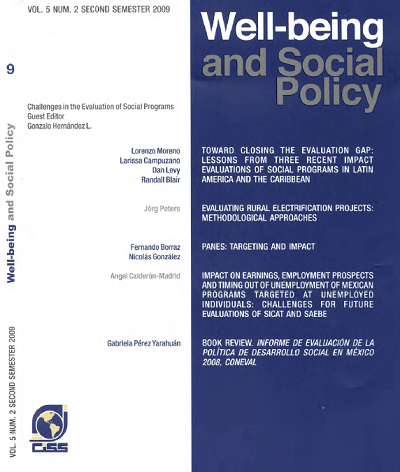
|
|
|
|

|
|
PANES: targeting and impact
This research paper intends to quantifit targeting performance in terms of the efficiency of the 1 National Plan for Social Emergency Assistance (PANES) implemented in Uruguay between 2005 and 2007 and determine its impact on relevant issues such as school attendance, child labor and the labor market. For this analysis , we used 2006 and 2007 Continual Household Survey (ECH) data.
Our outcomes...
|
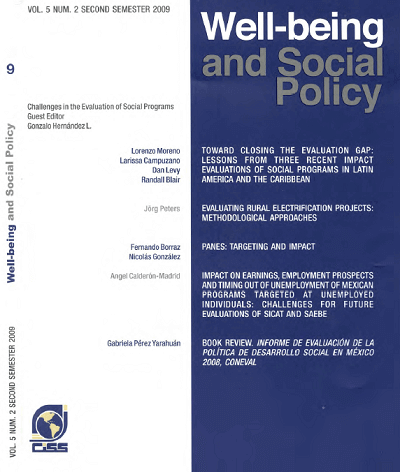
|
|
|
|

|
|
Impact on earning, employment prospects and timing out of unemployment of mexican programs targeted at unemployed individuals: challenges
his paper presents estimates of the impact of programs for unemployed workers on the performance of program beneficiaries in Mexico. We emphasize the significance of applying methodologies capable of avoiding statistical bias attributable to unobserved variables when measuring the impact on earnings and allowing to us properly estimate unemployment duration and work status after exiting from...
|
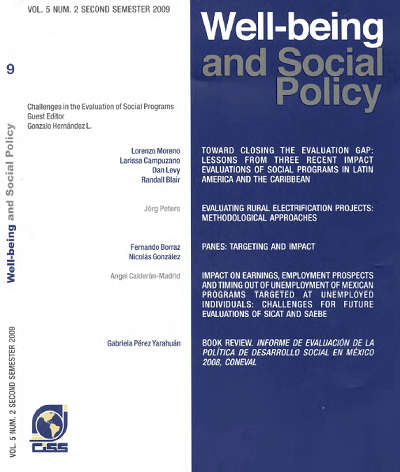
|
|
|
|

|
|
Book review. Informe de evaluación de la política de desarrollo social en México 2008, CONEVAL
The Evaluation Report on Social Development Policy in Mexico was published by the National Council for Social Development Policy Evaluation (CONEVAL) in 2008. The Council is one of the constituting elements of the new institutional framework to evaluate the public sector performance, particularly social development policies that were put in place mostly during the first decade of this century....
|
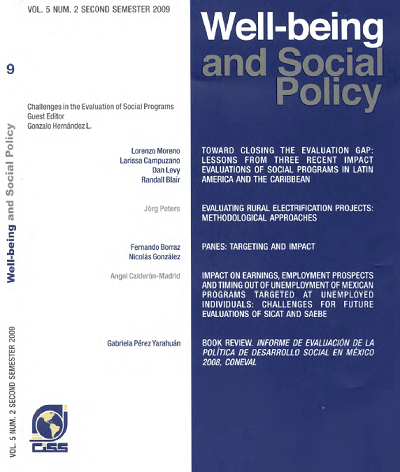
|
|
|
|

|
|
Hurricane Mitch and consumption growth of nicaraguan agricultural households
There is little micro-evidence on the persistence of natural disasters' welfare impacts. This paper assesses the effect of Hurricane Mitch on consumption of Nicaraguan agricultura) households. Mitch occurred in October 1998. Pre-post data is obtained from a nationally representative panel collected in 1998 and 2001. An additional survey was fielded in 1999 for households from the panel affected...
|
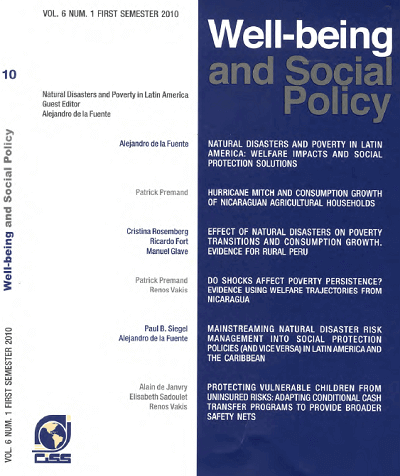
|
|
|
|

|
|
Protecting vulnerable children from uninsured risks: adapting conditional cash transfer programs to provide broader safety nets
Conditional cash transfer (CCT) programs have proved to be effective in inducing chronic poor households to invest in the human capital of their children while helping reduce poverty. They have also protected child human capital from the shocks that affect these households. In this paper, we argue that many non-poor households exposed to uninsured shocks have to use children as risk coping...
|
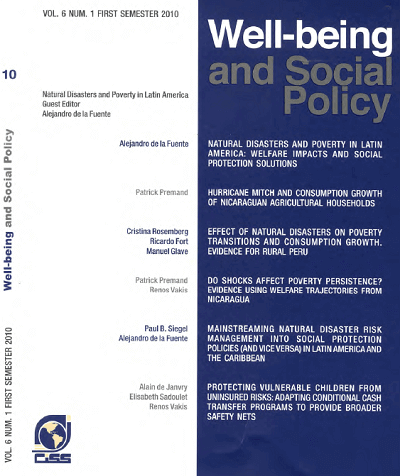
|
|
|
|
|